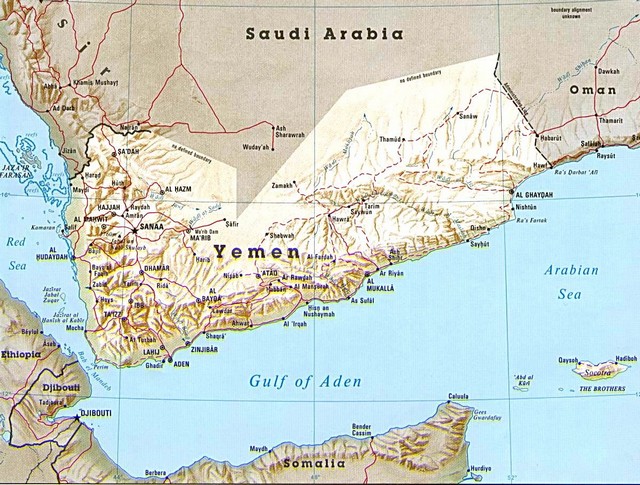By Bill Van Auken
The US-backed war against Yemen has left some 20 million people—nearly 80 percent of the country’s population—facing a humanitarian disaster, without access to adequate food, water and medical care, the United Nations top aid official informed member nations of the UN Security Council this week.
UN Emergency Relief Coordinator Stephen O’Brien described the situation confronting the population of the Arab world’s poorest country as “catastrophic,” placing much of the blame on the Saudi-led air strikes that have devastated Yemeni cities, and Saudi Arabia’s blockade of Yemen’s ports, which have prevented not only the arrival of emergency relief supplies but also the basic flow of goods that existed before the war.
“The blockade means it’s impossible to bring anything into the country,” Nuha Abdul Jaber, Oxfam’s humanitarian program director in the Yemeni capital of Sanaa told the Guardian newspaper. “There are lots of ships, with basic things like flour, that are not allowed to approach. The situation is deteriorating, hospitals are now shutting down, without diesel. People are dying of simple diseases. It is becoming almost impossible to survive.”
The Guardian , citing a report by the aid group Save the Children, reported that hospitals have closed down in at least 18 of the country’s 22 governates, along with 153 health centers that provided nutrition to at-risk children and 158 outpatient clinics that treated children under five. “At the same time, due to lack of clean water and sanitation, cholera and other diseases are on the rise,” the paper reported. “A dengue fever outbreak has been reported in Aden.”
The Saudi monarchy, meanwhile, has provided none of the $274 million for an emergency humanitarian fund that it promised to create when, in late April, it announced an end to what it had dubbed “Operation Decisive Storm” and declared that it would shift from military operations to “the political process.”
Since then, along with the blockade, the air war against Yemen’s impoverished population, now in its third month, has continued unabated. On Wednesday and Thursday alone, at least 58 civilians were reported killed, as bombs struck a number of areas including in the north near the Saudi Arabian border, where 48 people, mostly women and children, were reported killed in a single village. According to the UN’s estimate, at least 2,000 civilians have lost their lives since the onset of the war.
The Obama administration has provided the Saudis with logistical and intelligence support, helping to select targets for bombardment, sending refueling planes to keep the bombers of Saudi Arabia and its Gulf monarchy allies in the air and rushing bombs and missiles to replace those dropped on Yemen.
It was reported Thursday that the leadership of the Houthi rebels have agreed to attend UN-brokered peace talks in Geneva on June 14. Agence France Presse quoted Daifallah al-Shami, a politburo member of the Houthi militia’s political wing as saying, “We accepted the invitation of the United Nations to go to the negotiating table in Geneva without preconditions.”
The rebels have refused to submit to a one-sided resolution pushed through the United Nations Security Council in April by the US and its allies (with Russia abstaining), imposing an arms embargo directed solely against the Houthi rebels, while demanding that they disarm, cede territory under their control and recognize the government of President Abd Rabbuh Monsour Hadi, a puppet of Washington and Saudi Arabia, who fled the country in March. The Security Council resolution made no criticism whatsoever of the Saudi air strikes, launched against a civilian population in violation of international laws against aggressive war.
Representatives of Hadi, who is holed up in Riyadh, are also reported to have agreed to attend the Geneva talks. Previously, Hadi had demanded that the Houthis bow to the UN Security Council resolution before any peace talks.
Also expected to join the talks are representatives of former president and longtime strongman Ali Abdullah Saleh, whose loyalists allied themselves with the Houthis.
Not expected to participate are rebel factions in the south of Yemen who have resisted the Houthis but have no interest in restoring Hadi to power, fighting instead for the independence of South Yemen, a former British colony which existed as an independent state aligned with the former Soviet Union before its unification with the north in 1990. That unity broke down in 1994, resulting in a civil war that ended with the secessionist south defeated and forced back into unification.
The war in Yemen has led to a ratcheting up of tensions throughout the region, with the Saudi monarchy and Washington both charging Iran with supporting the Houthis, who are based among the Zaidi Shiites, and who make up approximately one third of Yemen’s population, dominating the north of the country.
Washington has repeatedly charged Tehran with supplying arms to the Houthis, while presenting no evidence. Iran has denied the charges.
06 June, 2015
WSWS.org

